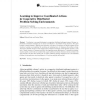72 search results - page 4 / 15 » No-regret learning and a mechanism for distributed multiagen... |
ATAL
2010
Springer
13 years 6 months ago
2010
Springer
An important drawback to the popular Belief, Desire, and Intentions (BDI) paradigm is that such systems include no element of learning from experience. In particular, the so-calle...
JAIR
2008
13 years 5 months ago
2008
Multi-agent planning in stochastic environments can be framed formally as a decentralized Markov decision problem. Many real-life distributed problems that arise in manufacturing,...
EPIA
2005
Springer
13 years 10 months ago
2005
Springer
In this paper, we look at the Multi-Agent Meeting Scheduling problem where distributed agents negotiate meeting times on behalf of their users. While many negotiation approaches ha...
ATAL
2005
Springer
13 years 10 months ago
2005
Springer
Many multi-agent systems consist of a complex network of autonomous yet interdependent agents. Examples of such networked multi-agent systems include supply chains and sensor netw...
ML
1998
ACM
13 years 4 months ago
1998
ACM
Abstract. Coordination is an essential technique in cooperative, distributed multiagent systems. However, sophisticated coordination strategies are not always cost-effective in all...

